- Page 1 and 2:
LIBRARY OF CONGRESS RULE INTERPRETA
- Page 3 and 4:
Chapter 1 General Rules for Descrip
- Page 5 and 6:
OBERLIN LCRI CUMULATED 1-3 rev. 12-
- Page 7 and 8:
OBERLIN LCRI CUMULATED 1-5 rev. 12-
- Page 9 and 10:
OBERLIN LCRI CUMULATED 1-7 rev. 12-
- Page 11 and 12:
OBERLIN LCRI CUMULATED 1-9 rev. 12-
- Page 13 and 14:
OBERLIN LCRI CUMULATED 1-11 rev. 12
- Page 15 and 16:
OBERLIN LCRI CUMULATED 1-13 rev. 12
- Page 17 and 18:
OBERLIN LCRI CUMULATED 1-15 rev. 12
- Page 19 and 20:
OBERLIN LCRI CUMULATED 1-17 rev. 12
- Page 21 and 22:
OBERLIN LCRI CUMULATED 1-19 rev. 12
- Page 23 and 24:
OBERLIN LCRI CUMULATED 1-21 rev. 12
- Page 25 and 26:
OBERLIN LCRI CUMULATED 1-23 rev. 12
- Page 27 and 28:
OBERLIN LCRI CUMULATED 1-25 rev. 12
- Page 29 and 30:
OBERLIN LCRI CUMULATED 1-27 rev . 1
- Page 31 and 32:
OBERLIN LCRI CUMULATED 1-29 rev. 12
- Page 33 and 34:
OBERLIN LCRI CUMULATED 1-31 rev. 12
- Page 35 and 36:
OBERLIN LCRI CUMULATED 1-33 rev. 12
- Page 37 and 38:
OBERLIN LCRI CUMULATED 1-35 rev. 12
- Page 39 and 40:
OBERLIN LCRI CUMULATED 1-37 rev. 12
- Page 41 and 42:
OBERLIN LCR I CUMULATED 1-39 rev. 1
- Page 43 and 44:
OBERLIN LCRI CUMULATED 1- 41 rev .
- Page 45 and 46:
OBERLIN LCRI CUMULATED 1-43 rev. 12
- Page 47 and 48:
OBERLIN LCRI CUMULATED 1-45 rev. 12
- Page 49 and 50:
OBERLIN LCRI CUMULATED 1-47 rev. 12
- Page 51 and 52:
OBERLIN LCRI CUMULATED 1-49 rev. 12
- Page 53 and 54:
OBERLIN LCRI CUMULATED 1-51 rev. 12
- Page 55 and 56:
OBERLIN LCRI CUMULATED 1-53 rev. 12
- Page 57 and 58:
OBERLIN LCRI CUMULATED 1-55 rev. 12
- Page 59 and 60:
OBERLIN LCRI CUMULATED 1-57 rev. 12
- Page 61 and 62:
OBERLIN LCRI CUMULATED 1-59 rev. 12
- Page 63 and 64:
OBERLIN LCRI CUMULATED 1-61 rev. 12
- Page 65 and 66:
OBERLIN LCRI CUMULATED 1-63 rev. 12
- Page 67 and 68:
OBERLIN LCRI CUMULATED 1-65 rev. 12
- Page 69 and 70:
OBERLIN LCRI CUMULATED 1-67 rev. 12
- Page 71 and 72:
OBERLIN LCRI CUMULATED 1-69 rev. 12
- Page 73 and 74:
OBERLIN LCRI CUMULATED 1-71 rev. 12
- Page 75 and 76:
OBERLIN LCRI CUMULATED 1-73 rev. 12
- Page 77 and 78:
OBERLIN LCRI CUMULATED 1-75 rev. 12
- Page 79 and 80:
OBERLIN LCRI CUMULATED 1-77 rev. 12
- Page 81 and 82:
OBERLIN LCRI CUMULATED 1-79 rev. 12
- Page 83 and 84:
OBERLIN LCRI CUMULATED 1-81 rev. 12
- Page 85 and 86:
OBERLIN LCRI CUMULATED 1-83 rev. 12
- Page 87 and 88:
OBERLIN LCRI CUMULATED 1-85 rev. 12
- Page 89 and 90:
OBERLIN LCRI CUMULATED 1-87 rev. 12
- Page 91 and 92:
OBERLIN LCRI CUMULATED 1-89 rev. 12
- Page 93 and 94:
Chapter 2 Books, Pamphlets, and Pri
- Page 95 and 96:
OBERLIN LCRI CUMULATED 2-3 rev. 11-
- Page 97 and 98:
OBERLIN LCRI CUMULATED 2-5 rev. 11-
- Page 99 and 100:
OBERLIN LCRI CUMULATED 2-7 rev. 11-
- Page 101 and 102:
OBERLIN LCRI CUMULATED 2-9 rev. 11-
- Page 103 and 104:
OBERLIN LCRI CUMULATED 2-11 rev. 11
- Page 105 and 106:
OBERLIN LCRI CUMULATED 2-13 rev. 11
- Page 107 and 108:
Chapter 3 Cartographic Materials 3.
- Page 109 and 110:
OBERLIN LCRI CUMULATED page 3-3 rev
- Page 111 and 112:
Chapter 4 Manuscripts (Including Ma
- Page 113 and 114:
Chapter 5 Music 5.1B1:CSB108 Title
- Page 115 and 116:
OBERLIN LCRI CUMULATED page 5-3 rev
- Page 117 and 118:
OBERLIN LCRI CUMULATED page 5-5 rev
- Page 119 and 120:
OBERLIN LCRI CUMULATED page 5-7 rev
- Page 121 and 122:
Chapter 6 Sound Recordings 6.0B1:CS
- Page 123 and 124:
OBERLIN LCRI CUMULATED 6-3 rev. 11-
- Page 125 and 126:
OBERLIN LCRI CUMULATED 6-5 rev. 11-
- Page 127 and 128:
OBERLIN LCRI CUMULATED 6-7 rev. 11-
- Page 129 and 130:
OBERLIN LCRI CUMULATED 6 - 9 rev. 1
- Page 131 and 132:
Chapter 7 Motion Pictures and Video
- Page 133 and 134:
OBERLIN LCRI CUMULATED 7-3 rev. 1-0
- Page 135 and 136:
Chapter 8 Graphic Materials 8.1C:CS
- Page 137 and 138:
OBERLIN LCRI CUMULATED 8-3 rev. 4-0
- Page 139 and 140:
Chapter 9 Machine-Readable Data Fil
- Page 141 and 142:
OBERLIN LCRI CUMULATED 9-3 rev. 1-0
- Page 143 and 144:
Chapter 10 Three-Dimensional Artefa
- Page 145 and 146:
Chapter 11 Microforms 11:CSB81 Micr
- Page 147 and 148:
OBERLIN LCRI CUMULATED page 11-3 re
- Page 149 and 150:
Chapter 12 Serials 12.0:CSB124 Gene
- Page 151 and 152:
OBERLIN LCRI CUMULATED 12-3 rev. 12
- Page 153 and 154:
OBERLIN LCRI CUMULATED 12-5 rev. 12
- Page 155 and 156:
OBERLIN LCRI CUMULATED 12-7 rev. 12
- Page 157 and 158:
OBERLIN LCRI CUMULATED 12-9 rev. 12
- Page 159:
OBERLIN LCRI CUMULATED 12-11 rev. 1
- Page 162 and 163:
OBERLIN LCRI CUMULATED 12-14 rev. 1
- Page 164 and 165:
OBERLIN LCRI CUMULATED 12-16 rev. 1
- Page 166 and 167:
OBERLIN LCRI CUMULATED 12-18 rev. 1
- Page 168 and 169:
OBERLIN LCRI CUMULATED 12-20 rev. 1
- Page 170 and 171:
OBERLIN LCRI CUMULATED 12-22 rev. 1
- Page 172 and 173:
OBERLIN LCRI CUMULATED 12-24 rev. 1
- Page 175 and 176:
OBERLIN LCRI CUMULATED 12-27 rev. 1
- Page 177 and 178:
Chapter 13 Analysis 13.3:CSB113 Ana
- Page 179 and 180:
OBERLIN LCRI CUMULATED page 13-3 re
- Page 181 and 182:
Chapter 21 Choice of Access Points
- Page 183 and 184:
OBERLIN LCRI CUMULATED 21-3 rev. 11
- Page 185 and 186:
OBERLIN LCRI CUMULATED 21-5 rev. 11
- Page 187 and 188:
OBERLIN LCRI CUMULATED 21-7 rev. 11
- Page 189 and 190:
OBERLIN LCRI CUMULATED 21-9 rev. 11
- Page 191 and 192:
OBERLIN LCRI CUMULATED 21-11 rev. 1
- Page 193 and 194:
OBERLIN LCRI CUMULATED 21-13 rev. 1
- Page 195 and 196:
OBERLIN LCRI CUMULATED 21-15 rev. 1
- Page 197 and 198:
OBERLIN LCRI CUMULATED 21-17 rev. 1
- Page 199 and 200:
OBERLIN LCRI CUMULATED 21-19 rev. 1
- Page 201 and 202:
OBERLIN LCRI CUMULATED 21-21 rev. 1
- Page 203 and 204:
OBERLIN LCRI CUMULATED 21-23 rev. 1
- Page 205 and 206:
OBERLIN LCRI CUMULATED 21-25 rev. 1
- Page 207 and 208:
OBERLIN LCRI CUMULATED 21-27 rev. 1
- Page 209 and 210: OBERLIN LCRI CUMULATED 21-29 rev. 1
- Page 211 and 212: OBERLIN LCRI CUMULATED 21-31 rev. 1
- Page 213 and 214: OBERLIN LCRI CUMULATED 21-33 rev. 1
- Page 215 and 216: OBERLIN LCRI CUMULATED 21-35 rev. 1
- Page 217 and 218: OBERLIN LCRI CUMULATED 21-37 rev. 1
- Page 219 and 220: OBERLIN LCRI CUMULATED 21-39 rev. 1
- Page 221 and 222: OBERLIN LCRI CUMULATED 21-41 rev. 1
- Page 223 and 224: OBERLIN LCRI CUMULATED 21-43 rev. 1
- Page 225 and 226: OBERLIN LCRI CUMULATED 21-45 rev. 1
- Page 227 and 228: OBERLIN LCRI CUMULATED 21-47 rev. 1
- Page 229 and 230: OBERLIN LCRI CUMULATED 21-49 rev. 1
- Page 231 and 232: OBERLIN LCRI CUMULATED 21-51 rev. 1
- Page 233 and 234: OBERLIN LCRI CUMULATED 21-53 rev. 1
- Page 235 and 236: OBERLIN LCRI CUMULATED 21-55 rev. 1
- Page 237 and 238: OBERLIN LCRI CUMULATED 21-57 rev. 1
- Page 239 and 240: OBERLIN LCRI CUMULATED 21-59 rev. 1
- Page 241 and 242: OBERLIN LCRI CUMULATED 21-61 rev. 1
- Page 243 and 244: OBERLIN LCRI CUMULATED 21-63 rev. 1
- Page 245 and 246: OBERLIN LCRI CUMULATED 21-65 rev. 1
- Page 247 and 248: OBERLIN LCRI CUMULATED 21-67 rev. 1
- Page 249 and 250: Chapter 22 Headings for Persons 22.
- Page 251 and 252: OBERLIN LCRI CUMULATED 22-3 rev. 12
- Page 253 and 254: OBERLIN LCRI CUMULATED 22-5 rev. 12
- Page 255 and 256: OBERLIN LCRI CUMULATED 22-7 rev. 12
- Page 257 and 258: OBERLIN LCRI CUMULATED 22-9 rev. 12
- Page 259: OBERLIN LCRI CUMULATED 22-11 rev. 1
- Page 263 and 264: OBERLIN LCRI CUMULATED 22-15 rev. 1
- Page 265 and 266: OBERLIN LCRI CUMULATED 22-17 rev. 1
- Page 267 and 268: OBERLIN LCRI CUMULATED 22-19 rev. 1
- Page 269 and 270: OBERLIN LCRI CUMULATED 22-21 rev. 1
- Page 271 and 272: OBERLIN LCRI CUMULATED 22-23 rev. 1
- Page 273 and 274: OBERLIN LCRI CUMULATED 22-25 rev. 1
- Page 275 and 276: OBERLIN LCRI CUMULATED 22-27 rev. 1
- Page 277 and 278: OBERLIN LCRI CUMULATED 22-29 rev. 1
- Page 279 and 280: OBERLIN LCRI CUMULATED 22-31 rev. 1
- Page 281 and 282: Chapter 23 Geographic Names 23.1:CS
- Page 283 and 284: OBERLIN LCRI CUMULATED 23-3 rev. 12
- Page 285 and 286: OBERLIN LCRI CUMULATED rev. 23-5 12
- Page 287 and 288: OBERLIN LCRI CUMULATED 23-7 rev. 12
- Page 289 and 290: OBERLIN LCRI CUMULATED 23-9 rev. 12
- Page 291 and 292: OBERLIN LCRI CUMULATED rev. 23-11 1
- Page 293 and 294: OBERLIN LCRI CUMULATED 23-13 rev. 1
- Page 295 and 296: Chapter 24 Headings for Corporate B
- Page 297 and 298: OBERLIN LCRI CUMULATED 24-3 rev. 12
- Page 299 and 300: OBERLIN LCRI CUMULATED 24-5 rev. 12
- Page 301 and 302: OBERLIN LCRI CUMULATED 24-7 rev. 12
- Page 303 and 304: OBERLIN LCRI CUMULATED 24-9 rev. 12
- Page 305 and 306: OBERLIN LCRI CUMULATED 24-11 rev. 1
- Page 307 and 308: OBERLIN LCRI CUMULATED 24-13 rev. 1
- Page 309 and 310: OBERLIN LCRI CUMULATED 24-15 rev. 1
- Page 311 and 312:
OBERLIN LCRI CUMULATED 24-17 rev. 1
- Page 313 and 314:
OBERLIN LCRI CUMULATED 24-19 rev. 1
- Page 315 and 316:
OBERLIN LCRI CUMULATED 24-21 rev. 1
- Page 317 and 318:
OBERLIN LCRI CUMULATED 24-23 rev. 1
- Page 319 and 320:
OBERLIN LCRI CUMULATED 24-25 rev. 1
- Page 321 and 322:
OBERLIN LCRI CUMULATED 24-27 rev. 1
- Page 323 and 324:
OBERLIN LCRI CUMULATED 24-29 rev. 1
- Page 325 and 326:
OBERLIN LCRI CUMULATED 24-31 rev. 1
- Page 327 and 328:
OBERLIN LCRI CUMULATED 24-33 rev. 1
- Page 329 and 330:
OBERLIN LCRI CUMULATED 24-35 rev. 1
- Page 331 and 332:
OBERLIN LCRI CUMULATED 24-37 rev. 1
- Page 333 and 334:
OBERLIN LCRI CUMULATED 24-39 rev. 1
- Page 335 and 336:
OBERLIN LCRI CUMULATED 24-41 rev. 1
- Page 337 and 338:
OBERLIN LCRI CUMULATED 24-43 rev. 1
- Page 339 and 340:
OBERLIN LCRI CUMULATED 24-45 rev. 1
- Page 341 and 342:
OBERLIN LCRI CUMULATED 24-47 rev. 1
- Page 343 and 344:
Chapter 25 Uniform Titles 25.1:CSB1
- Page 345 and 346:
OBERLIN LCRI CUMULATED page 25-3 re
- Page 347 and 348:
OBERLIN LCRI CUMULATED page 25-5 re
- Page 349 and 350:
OBERLIN LCRI CUMULATED page 25-7 re
- Page 351 and 352:
OBERLIN LCRI CUMULATED page 25-9 re
- Page 353 and 354:
OBERLIN LCRI CUMULATED page 25-11 r
- Page 355 and 356:
OBERLIN LCRI CUMULATED page 25-13 r
- Page 357 and 358:
OBERLIN LCRI CUMULATED page 25-15 r
- Page 359 and 360:
OBERLIN LCRI CUMULATED page 25-17 r
- Page 361 and 362:
OBERLIN LCRI CUMULATED page 25-19 r
- Page 363 and 364:
OBERLIN LCRI CUMULATED page 25-21 r
- Page 365 and 366:
OBERLIN LCRI CUMULATED page 25-23 r
- Page 367 and 368:
OBERLIN LCRI CUMULATED page 25-25 r
- Page 369 and 370:
OBERLIN LCRI CUMULATED page 25-27 r
- Page 371 and 372:
OBERLIN LCRI CUMULATED page 25-29 r
- Page 373 and 374:
OBERLIN LCRI CUMULATED page 25-31 r
- Page 375 and 376:
OBERLIN LCRI CUMULATED page 25-33 r
- Page 377 and 378:
OBERLIN LCRI CUMULATED page 25-35 r
- Page 379 and 380:
OBERLIN LCRI CUMULATED page 25-37 r
- Page 381 and 382:
OBERLIN LCRI CUMULATED page 25-39 r
- Page 383 and 384:
OBERLIN LCRI CUMULATED page 25-41 r
- Page 385 and 386:
OBERLIN LCRI CUMULATED page 25-43 r
- Page 387 and 388:
OBERLIN LCRI CUMULATED page 25-45 r
- Page 389 and 390:
OBERLIN LCRI CUMULATED page 25-47 r
- Page 391 and 392:
OBERLIN LCRI CUMULATED page 25-49 r
- Page 393 and 394:
OBERLIN LCRI CUMULATED page 25-51 r
- Page 395 and 396:
OBERLIN LCRI CUMULATED page 25-53 r
- Page 397 and 398:
OBERLIN LCRI CUMULATED page 25-55 r
- Page 399 and 400:
OBERLIN LCRI CUMULATED page 25-57 r
- Page 401 and 402:
OBERLIN LCRI CUMULATED page 25-59 r
- Page 403 and 404:
OBERLIN LCRI CUMULATED page 25-61 r
- Page 405 and 406:
OBERLIN LCRI CUMULATED page 25-63 r
- Page 407 and 408:
OBERLIN LCRI CUMULATED page 25-65 r
- Page 409 and 410:
OBERLIN LCRI CUMULATED page 25-67 r
- Page 411 and 412:
OBERLIN LCRI CUMULATED page 25-69 r
- Page 413 and 414:
OBERLIN LCRI CUMULATED page 25-71 r
- Page 415 and 416:
OBERLIN LCRI CUMULATED page 25-73 r
- Page 417 and 418:
OBERLIN LCRI CUMULATED page 25-75 r
- Page 419 and 420:
OBERLIN LCRI CUMULATED page 25-77 r
- Page 421 and 422:
OBERLIN LCRI CUMULATED page 25-79 r
- Page 423 and 424:
OBERLIN LCRI CUMULATED page 25-81 r
- Page 425 and 426:
OBERLIN LCRI CUMULATED page 26-2 re
- Page 427 and 428:
OBERLIN LCRI CUMULATED page 26-4 re
- Page 429 and 430:
OBERLIN LCRI CUMULATED page 26-6 re
- Page 431 and 432:
OBERLIN LCRI CUMULATED page 26-8 re
- Page 433 and 434:
OBERLIN LCRI CUMULATED page 26-10 r
- Page 435 and 436:
OBERLIN LCRI CUMULATED page 26-12 r
- Page 437 and 438:
OBERLIN LCRI CUMULATED page 26-14 r
- Page 439 and 440:
OBERLIN LCRI CUMULATED page 26-16 r
- Page 441 and 442:
OBERLIN LCRI CUMULATED page 26-18 r
- Page 443 and 444:
OBERLIN LCRI CUMULATED page 26-20 r
- Page 445 and 446:
OBERLIN LCRI CUMULATED page 26-22 r
- Page 447 and 448:
OBERLIN LCRI CUMULATED page 26-24 r
- Page 449 and 450:
OBERLIN LCRI CUMULATED page 26-26 r
- Page 451 and 452:
OBERLIN LCRI CUMULATED page 26-28 r
- Page 453 and 454:
OBERLIN LCRI CUMULATED page 26-30 r
- Page 455 and 456:
OBERLIN LCRI CUMULATED page 26-32 r
- Page 457 and 458:
OBERLIN LCRI CUMULATED page 26-34 r
- Page 459 and 460:
OBERLIN LCRI CUMULATED page 26-36 r
- Page 461 and 462:
OBERLIN LCRI CUMULATED page 26-38 r
- Page 463 and 464:
OBERLIN LCRI CUMULATED page 26-40 r
- Page 465 and 466:
OBERLIN LCRI CUMULATED page 26-42 r
- Page 467 and 468:
OBERLIN LCRI CUMULATED page 26-44 r
- Page 469 and 470:
OBERLIN LCRI CUMULATED page 26-46 r
- Page 471 and 472:
OBERLIN LCRI CUMULATED page 26-48 r
- Page 473 and 474:
OBERLIN LCRI CUMULATED page 26- 50
- Page 475 and 476:
OBERLIN LCRI CUMULATED page 26- 52
- Page 477 and 478:
OBERLIN LCRI CUMULATED page 26-54 r
- Page 479 and 480:
OBERLIN LCRI CUMULATED page 26-56 r
- Page 481 and 482:
OBERLIN LCRI CUMULATED page 26-58 r
- Page 483 and 484:
Appendix A A.2A :CSB16 General rule
- Page 485 and 486:
OBERLIN LCRI CUMULATED page A-3 rev
- Page 487 and 488:
OBERLIN LCRI CUMULATED page A-5 rev
- Page 489 and 490:
Appendix B B.4:CSB13 For a language
- Page 491 and 492:
Appendix C C.1:CSB104 General rule
- Page 493 and 494:
OBERLIN LCRI CUMULATED page C-3 rev
- Page 495 and 496:
OBERLIN LCRI CUMULATED page C-5 rev
- Page 497 and 498:
Appendix D Chorus Score (CSB 108) T

















